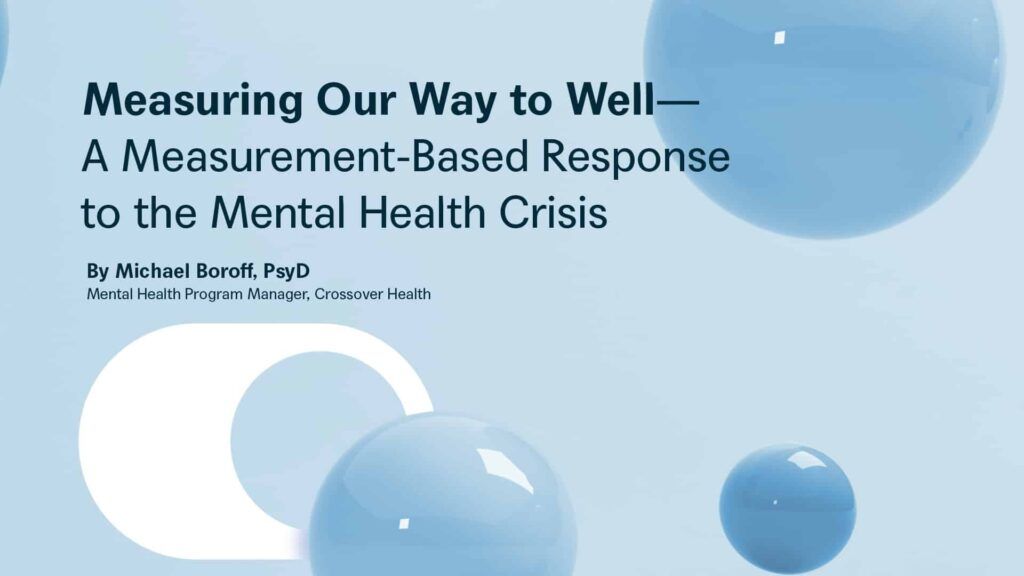
Measuring Our Way to Well–A Measurement-Based Response to the Mental Health Crisis
SAN CLEMENTE, Calif., December 9, 2021 — Crossover Health, the leader in delivering value-based hybrid care, today published a new white paper, “Measuring Our Way to Well—A Measurement-Based Response to the Mental Health Crisis.” As the nation’s mental health crisis continues to unfold, the paper’s findings validate the clinical efficacy of a measurement-based mental health care model to improve outcomes in fewer visits and help decrease wait times. Conducted over a sixth-month period coinciding with the pandemic, the study also found Crossover to provide a better standard of mental health care than the community.
According to the white paper author and Crossover Health Mental Health Program Manager Michael Boroff, PsyD, “More than a year and a half into the COVID-19 pandemic, the demand for clinically effective mental health services in the U.S. continues to outpace supply. Curtailing today’s mental health crisis starts with outcomes transparency— it is time to reject the lack of standardized measurement and goal-setting that has made it nearly impossible to measure progress and improve outcomes in mental health care so that people can actually start to get better.”
Key takeaways from the report include:
- Patients who received mental health care from the measurement-based care model used by Crossover saw significantly greater improvement in their overall mental health status than those who received care from the community.
- Crossover patients’ average Behavioral Health Index (BHI) score improved by 30% from baseline—from 52.2 to 36.8 at the end of their treatment—compared to just 10% improvement in the community (53 to 47.9).
- Providers who used a measurement-based mental health care model were able to achieve significantly better overall mental health outcomes in just over six visits compared to alternative approaches.
- For many providers treating people with conditions such as anxiety or depression, the once-weekly therapy visit is commonplace. The never-ending treatment period that has become the industry standard for many therapists is seldom associated with symptom relief and can prohibit movement toward the patients’ goals.
- The average time from booking an appointment to the first visit with a Crossover mental health provider was 6.6 days, compared to an ever-rising national average of 48 days.
- The average therapeutic alliance score for patients who were seen by a Crossover mental health provider was 13.3, indicating a favorable patient-therapist relationship (compared to 12.7 in the community).
- For the study duration, average therapeutic alliance scores improved by 0.5 per month, showing a positive feedback loop was driving steady progress.
About Crossover Health
Crossover Health is the leader in delivering value-based hybrid care. The company’s national medical group delivers at scale, Primary Health, a proven care model driven by an interdisciplinary team inclusive of primary care, physical medicine, mental health, health coaching and care navigation. With a focus on wellbeing and prevention that extends beyond traditional sick care, Crossover builds trusted relationships with its members and flexibly surrounds them with care— in-person, online, and anytime— based on the member preference. Combining a sophisticated approach to data analytics that incorporates social determinants of health, Crossover delivers concrete results and measurable value for employers, payers, and most importantly, members. Together we are building health as it should be and engaging a community of members to live their best health. To learn more, visit crossoverhealth.com or follow us on social media @crossoverhealth.
Media Contacts:
Perri Mayer
Weber Shandwick for Crossover Health
312-988-2218
Sydney Bronstein
Media Relations
Crossover Health
sydney.bronstein@crossoverhealth.com
312-330-5336